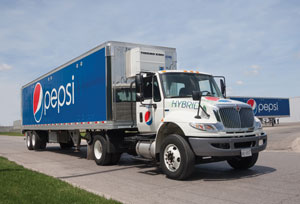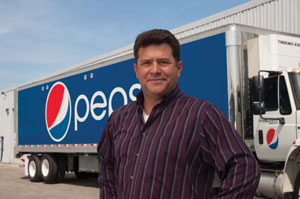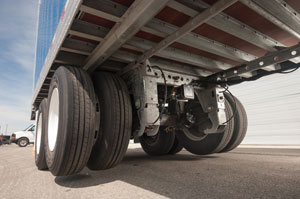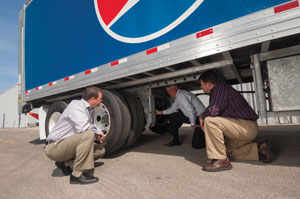 PepsiCo’s commitment to environmental sustainability is “finding innovative ways to cut costs and minimize our impact on the environment through energy and water conservation and reduction of packaging volume.”
PepsiCo’s commitment to environmental sustainability is “finding innovative ways to cut costs and minimize our impact on the environment through energy and water conservation and reduction of packaging volume.”
With about 100,000 distribution routes and approximately 10 million outlets served directly or through bottlers worldwide on a regular basis, the impact that the PepsiCo fleet can have is significant. That is especially the case for PepsiCo North America Beverages, notes Roland Bailey, CTP, fleet manager.
PepsiCo North America Beverages manages the manufacturing, sales and distribution of PepsiCo beverages in the U.S. and Canada, handling approximately 75% of PepsiCo’s North American beverage volume. “We operate a very diverse fleet across all our brands and fuel savings are one of the major factors that influence our purchasing and specification decisions,” Bailey explains.
“Customer requirements, life cycle cost, technology, and service and parts support are factors as well,” Bailey continues. “The choices we make differ by type of asset, and by our planned trade cycles. Typically, we operate long haul tractors for five years or 750,000 miles and power units in P&D operations can be in service for many more years.”
Long service life also is the case for the four different models of trailers in use at PepsiCo North America Beverages, which generally last 18 to 20 years in the fleet. Included are 40-ft. sheet and post and 40-ft. high base rail composite dry vans equipped with lift gates for delivery operations. In addition, there are 53-ft. lightweight, high base rail composite and sheet and post units used in over the road service.
Informed decisions
“Working with suppliers to evaluate new systems and components allows us to see real world results in our own environment,” Bailey says. “That way we can make more informed product decisions and accurate return on investment calculations prior to making wholesale decisions on purchases.
“For example,” Bailey explains further, “one of our new go to market strategies utilizes tandem axle dry van trailers to deliver products to customers. In this environment, as in our previous bay trailer delivery system, we work off a diminishing load. We drop 20% to 60% of our weight early and then deliver to smaller accounts for the rest of the day until the trailer is empty.
“Under our new strategy,” Bailey continues, “we use only dry van trailers on all routes to make early morning deliveries to bulk accounts first, rather than using those vehicles for large dedicated stops and bay trailers for deliveries to smaller customers. The challenge in that strategy is that we only need tandem axle capability for a short period of time during the first part of the day.”

The answer for PepsiCo North America Beverages is the SAF CBX40 Auto-PosiLift automatic axle lift system from SAF-Holland, which is now being specified on all four types of trailers used in the operation. “The Auto-PosiLift system allows us all the benefits of tandem axle capability only when it is needed and takes the front axle out of play when our trailers’ axle weight reaches 18,000 lbs. on the rear suspension,” Bailey explains.
“The lift system also takes driver intervention out of the equation,” he adds, “so we will never overload a single axle and never have to wonder if the front axle is deployed when it could be raised. That saves fuel, tires and brakes, increases suspension component life and lowers costs for wheel end maintenance.”
| Pepsi Beverages Company Tractor Specifications Model: International 4400 SBA 4X2 Wheelbase: 152 in. Engine: International MaxxForce 9L Transmission: Allison 3000 Front Axle: Meritor Wide Trac Front Suspension: spring Rear Axle: Meritor RS-23, 23,000 lb. Rear Suspension: air ride Wheel Seals: Stemco Brakes: Meritor ABS: Bendix Automatic Slack Adjusters: Meritor Wheels: Accuride, steel disc 5th Wheel: Fontaine Air Dryer: Bendix AD-IS Fan Clutch: Horton Starter: Mitsubishi Alternator: Bosch 160 amp Lighting: LED Fuel Tank: single 50 gal. Paint: Pepsi White |
Designed for varying load operations like those in beverage distribution, less-than-truckload, food service and other multi-stop fleets, as well as fleets running empty miles, the SAF CBX40 with the Auto-PosiLift uses a unique electronic control unit with built-in functionality supplied by Meritor WABCO. A sensor in the system’s air spring supply line reads air spring pressure and determines whether to automatically raise the front axle or leave it in the down position.
With the power on and trailer parking brakes released, the Auto-PosiLift system is programmed to automatically lift the front axle in a trailer tandem a minimum of 4 in. when it senses that only one axle is necessary to carry the load. With the tractor power off, the trailer parking brakes engaged or in the event of a loss of power, the system automatically deploys the front axle to the down position. The position of the front axle remains constant when the vehicle is in motion.
Multiple strategies
PepsiCo North America Beverages also is deploying multiple strategies and technologies to reduce emissions and idling and improve fuel efficiency. Among them, according to Bailey, are specifying only low rolling resistance replacement tires and using engine electronics to limit idle time to three minutes and to set top speed at 65 MPH on applicable power units.
In addition, hybrid technology is being adopted where it fits operational needs. Furthermore, the fleet now includes Ford Transit Connect support vehicles, which are netting a 4 to 10 MPG improvement over previous models, and full size cargo vans are being replaced by diesel powered Sprinters to gain an average of more than 10 MPG on every vehicle.
| Pepsi Beverages Company Dry Van Trailer Specifications Models: Great Dane, Hyundai; 40-ft. sheet and post, 40-ft. high base rail composite; 53-ft. sheet and post, 53-ft. high base rail composite Heater (option): Thermo King Doors: 40-ft. Whiting roll up; 53-ft. Xxentria composite swing Floor: Havco Composite Landing Gear: Great Dane Model 60; Holland Atlas 55 Axles: SAF, sliding tandem Suspension: SAF CBX40 Air Ride with Auto-PosiLift Wheel Ends: Stemco Platinum Performance; Discover Seals, Sentinel Hub Cap, Pro Torq Nut; Chevron Delo synthetic grease Brakes: Meritor Q-Plus; Abex linings Automatic Slack Adjuster: Meritor Parking Brakes: Haldex 30/30 Lifeseal chambers; Sealco control valve ABS: Meritor WABCO 2S/1M Tires: 295/75R22.5 TPMS: Meritor PSI Tire Inflation System with Therm Alert Gladhands: Phillips Qwik-E Lighting & Electrical: Truck-Lite LED lamps; Phillips Permalogic front receptacle Lift Gates (40-ft. models): Maxon, Holland |
Those kinds of fuel savings, and the other MPG improvements being realized at PepsiCo, are a key part of meeting the company’s commitment to “finding innovative ways to cut costs and minimize our impact on the environment through energy and water conservation and reduction of packaging volume,” Bailey says.
